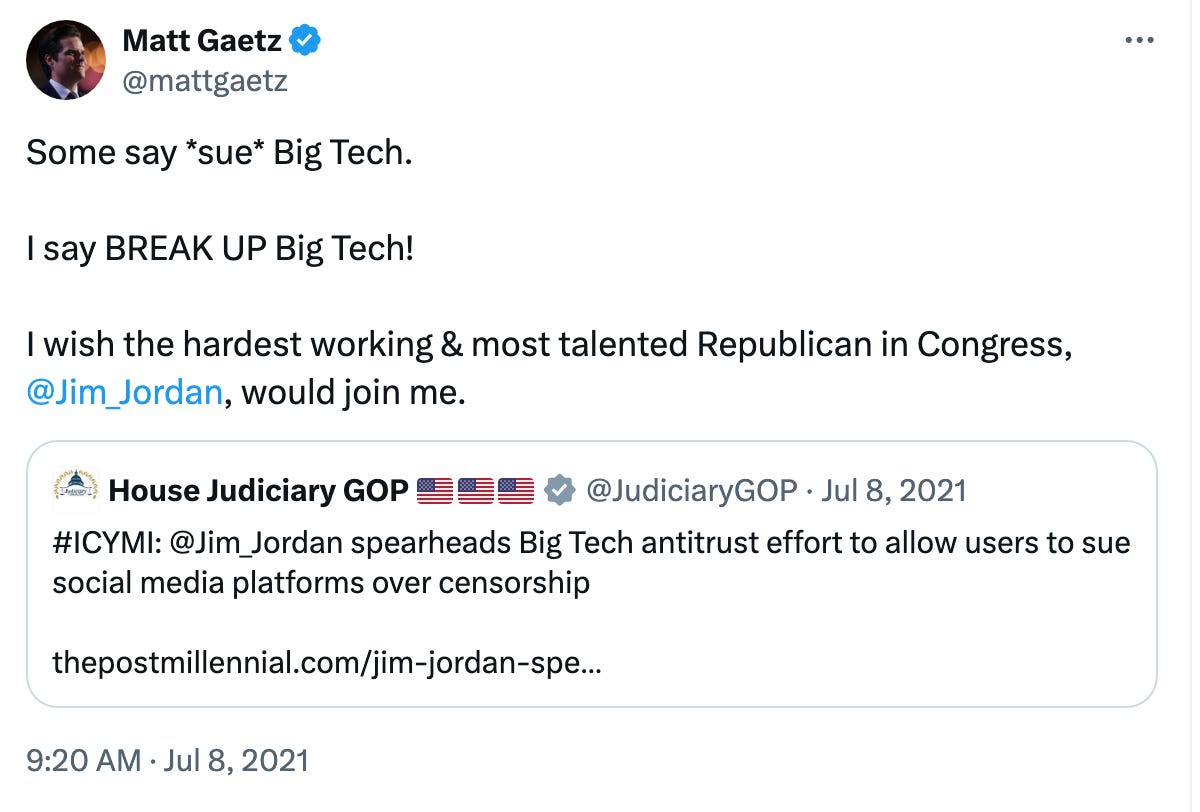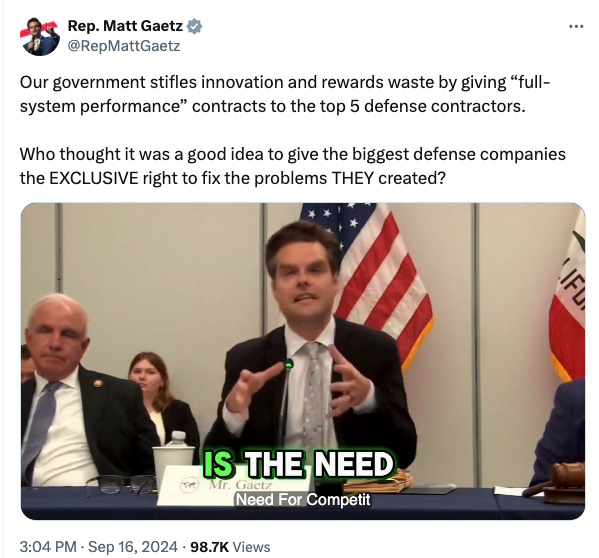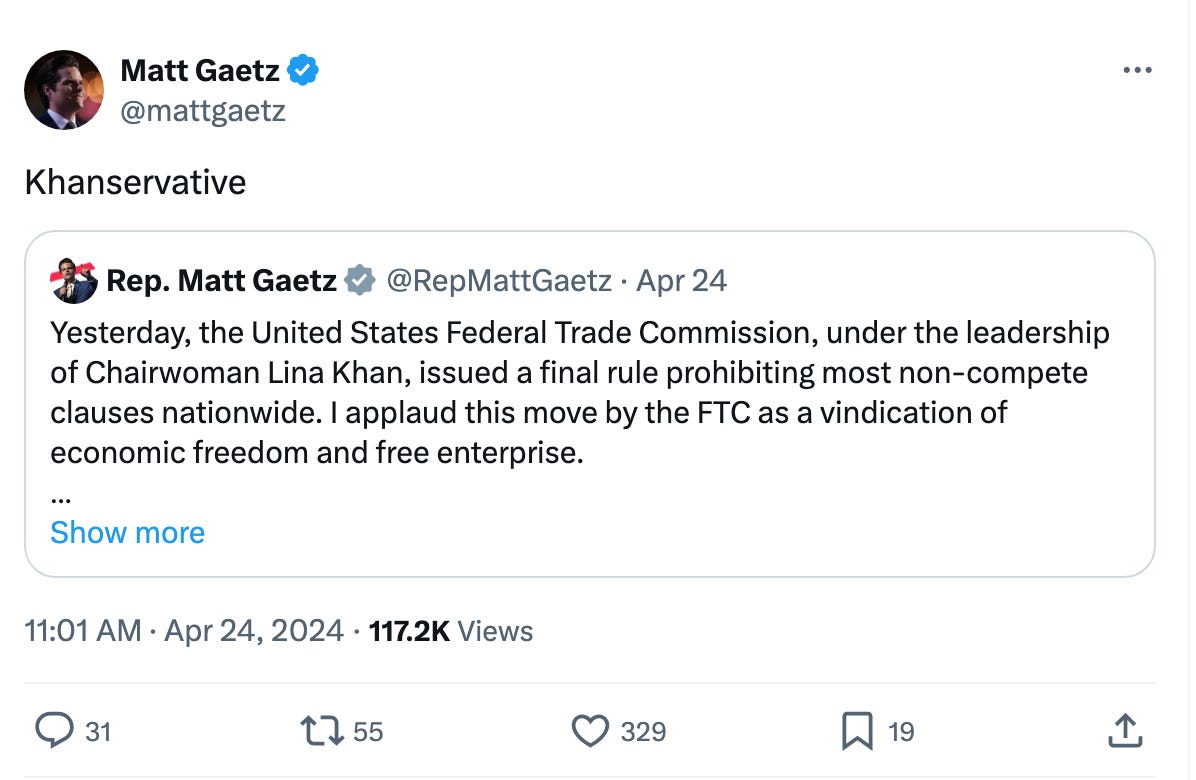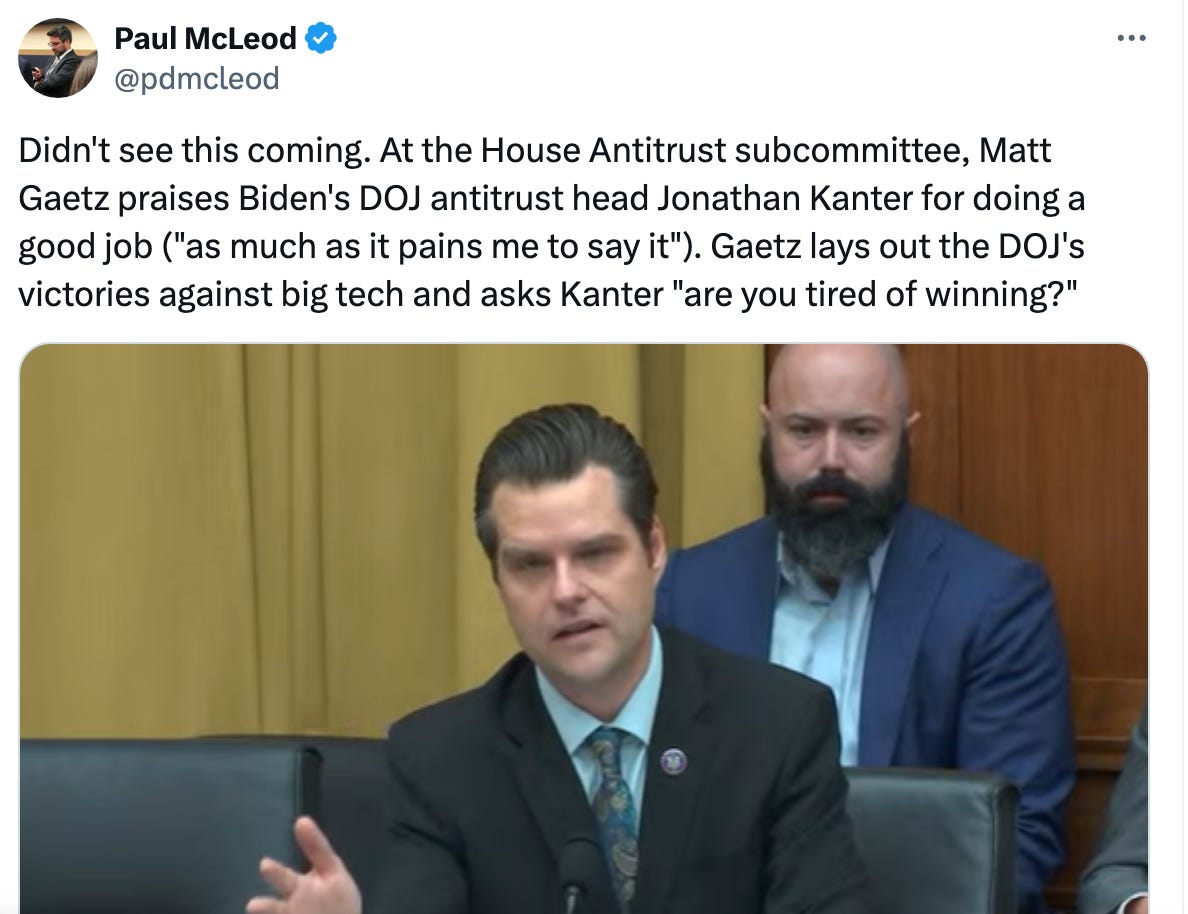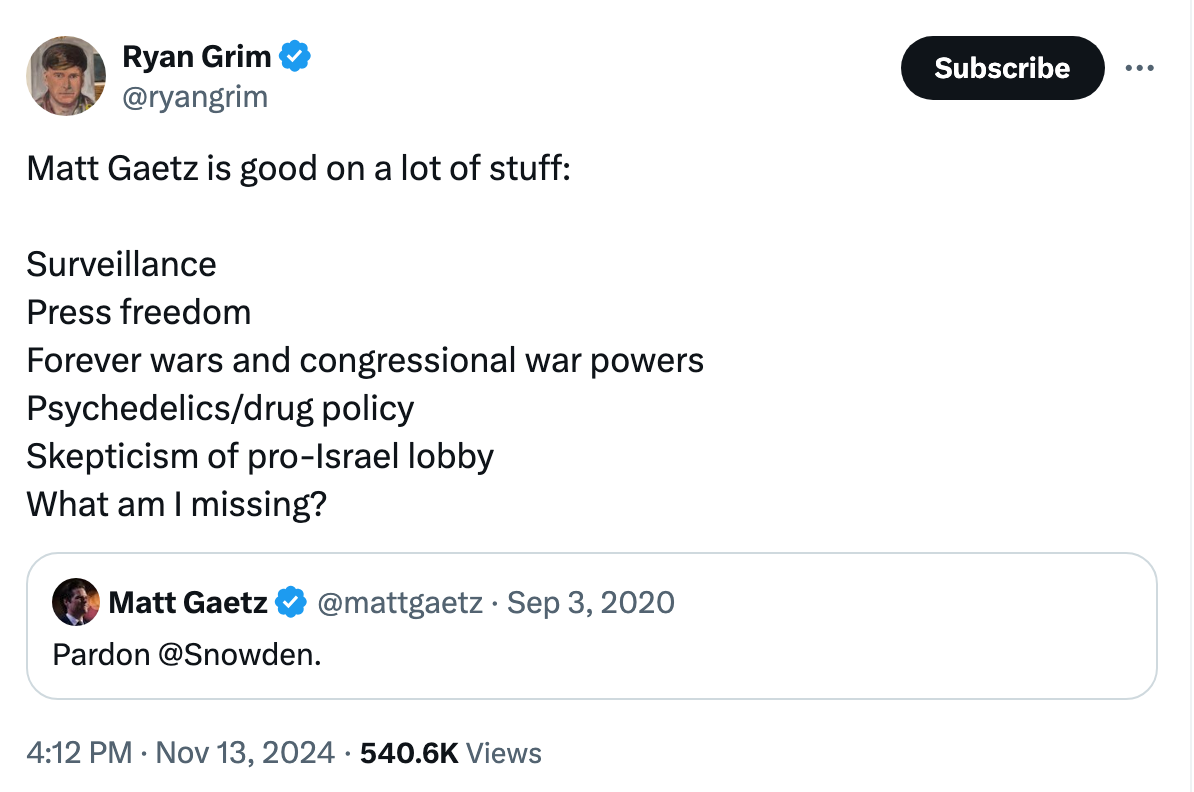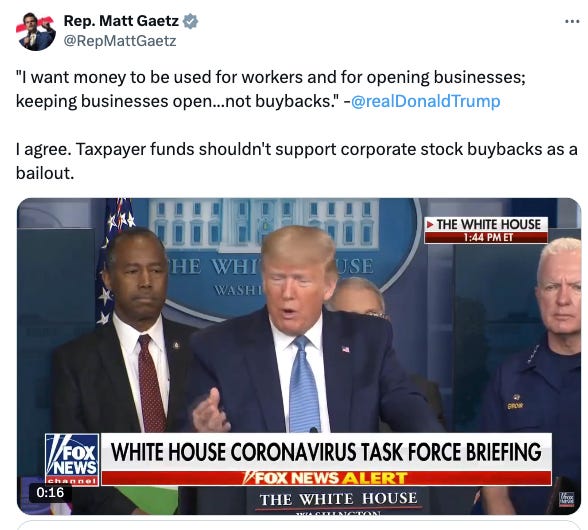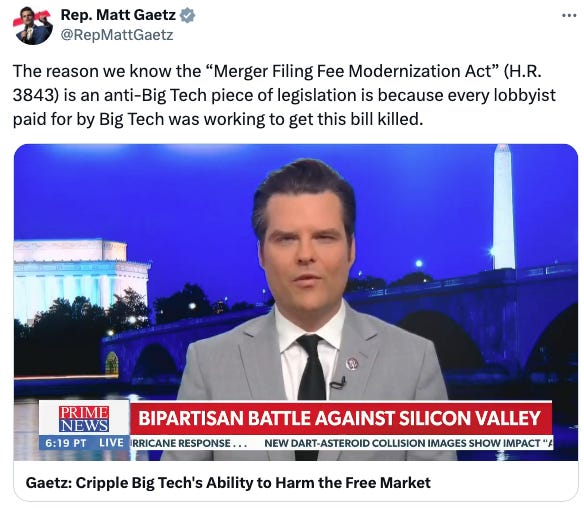Trump Nominates "Khanservative" Matt Gaetz as Attorney GeneralThings are getting extremely weird as the President-elect puts forward an anti-establishment controversial pick as the top law enforcer of the U.S.“It is my belief that the number one threat to our liberty is big government. It is also my belief that the number two big threat to our liberty is big business, when big business is able to use the apparatus of government to wrap around its objectives.” - Rep. Matt Gaetz In 2021, Congress nearly passed a set of laws to constrain the power of big tech, the first significant legal reform of antitrust in half a century. And one of the key actors in the debate was Matt Gaetz, the Florida Congressman who was just appointed by Donald Trump to be the Attorney General of the United States. The Attorney General is the boss of the boss of the Antitrust Division, so Gaetz will have an important role in determining whether the government continues to litigate antitrust suits against Visa, Apple, Google, RealPage, Live Nation/Ticketmaster, and UnitedHealth Group, among others. Moreover, the power of the DOJ is far more extensive on corporate matters than just antitrust, with jurisdiction over fraud, criminal behavior, civil violations, civil rights, narcotics enforcement, regulation of alcohol markets, the Federal Bureau of Investigation, and national security, for starters. For example, the FBI used to be a critical agency for antitrust investigations, but during the War on Terror, its white collar investigative resources went to counter-terrorism. Will the next Attorney General reverse that choice? That would be nice to know! In other words, it’s important to examine Gaetz’s unusual track record on corporate power, if for no other reason than he will sit for confirmation hearings and there are important questions to ask. Of course, there’s a lot beyond just Gaetz’s views. There are sordid stories about his personal behavior, as well as ethics investigations, though he has not been prosecuted and his constituents reelected him despite widespread reporting. And law enforcement is an awesome power. There are always important constitutional questions involved in this role, perhaps more during Trump’s second term. Trump is seeking to reshaping the Federal government by refusing to spend money that Congress has appropriated, which is an aggressive seizure of power. Deportation, censorship, civil service protections, war and peace, and the fusion of private actors like Elon Musk with government are outstanding issues, as are questions of political retaliation and pardons. We’ve never had a President under criminal indictment, and now we do. In addition, while Gaetz has an interesting track record, being a member of Congress is very different than working for someone else as an Attorney General. Wall Street deal-makers are absolutely ecstatic about the incoming regime, so those with capital to deploy seem to imagine this will be an era of big business dominance. Still, I think it’s worth telling you what I saw from Gaetz. I paid fairly close attention to his views on corporate power, since he was a member of the Antitrust Subcommittee for several years during a major big tech investigation and legislative action. And one story will help illustrate his unusual approach. In March of 2021, the committee convened for a marathon session to debate six different bills on antitrust and big tech. The markup was exhausting, starting on Wednesday afternoon and going into Thursday. It was the culmination of years of effort, investigations going through millions of documents, hearings with various big tech CEOs, depositions, and so forth. The effort split the parties, though in general Democrats were more supportive of antitrust, and Republicans were more against it. Yet there were notable dissidents on both sides. The pro-monopoly faction was led by Republican Jim Jordan and Democrat Zoe Lofgren. They faced off against Democrat David Cicilline and Republicans Ken Buck and Matt Gaetz, who were foes of big tech. Gaetz, in other words, was part of a minority of Republicans opposing corporate power. But to say he was one of that unusual crowd understates his role. At one point during the markup, at 3am or so, Cicilline allowed an amendment that punched a loophole in one of the bills. The amendment would have let big tech firms purchase companies for less than $50 million in value without much scrutiny. It wasn’t a big deal; everyone was exhausted and wanted to just move along. But at that moment, Gaetz chimed in and said he opposed it. He didn’t win. But he was the only member in either party to say he wanted no loopholes, no matter how small, for big tech. When the spotlight is on, most people do not want to appear craven. But when the spotlight is not on, when it’s 3 am and the only people who are paying attention are powerful lobbyists from organized money, well, that’s when someone tells you what their priorities are. And in that case, Gaetz said he’d fight for every inch, even if he would get no credit, even if everyone was tired, and even if he was going to lose, and in losing, upset several corporations worth a trillion dollars apiece. 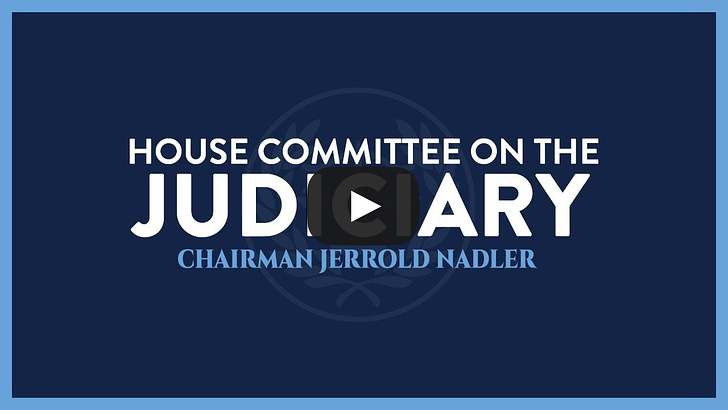 And Gaetz takes this approach beyond big tech to big business and the national security apparatus in general, and to a broader sense of political economy. As a member of the House Armed Services Committee, he had a widely watched hearing with the Defense Secretary over Lockheed Martin’s ownership of the intellectual property of the F-35, a defense aerospace project that is now costing a trillion dollar plus of defense outlays. I’ve spoken with Democratic members seeking to reform the defense base, Gaetz is aligned with that group. On basic corporate stuff, he’s also unusual for a Republican. Gaetz is the most aggressive GOP opponent of arbitration agreements used by big corporations to avoid being sued, agreements in those click-and-agree style contracts no one reads that lock in consumers and employees. He was one of the few Republicans who fought with conservative Jim Jordan to actually pass a bill blocking arbitration agreements that strip sexual assault and sexual harassment victims of their right to sue in court. Gaetz proudly calls himself a Lina Khan fan, and filed a brief with the conservative Fifth Circuit asserting that the Federal Trade Commission has the authority to ban non-compete agreements, and personally hosted her as a guest on a show on Newsmax to discuss how to get rid of “creepy” commercial surveillance. He has praised the Biden Antitrust Division’s Jonathan Kanter’s work on Google. There’s more. Gaetz is also a well-known opponent of government surveillance, has called for pardoning Edward Snowden, and seeks an end to foreign wars. He has also sought to ban stock trading by members, working with high-profile left-wing Democrat Alexandria Ocasio-Cortez and challenging his own party. “AOC is wrong a lot. She’d probably say the same thing about me,” Gaetz said. “But she’s not corrupt. And I will work with anyone and everyone to ensure that Congress is not so compromised.” These anti-establishment views are relevant to corporate power for reasons I’ll get into. Now, I don’t want to make Gaetz out to be a hero, that’s not the point of the story. He has his own reasons for resigning from Congress and taking a bigger job that have nothing to do with policy. In his announcement of Gaetz’s nomination, Trump did not mention anything related to corporate power. The President-elect now apparently watches CNBC every morning and particularly likes the pro-merger anchor Joe Kernen, so I doubt Gaetz will have a mandate on corporate power. But this pick is much more about fights within the GOP and the national security/corporate establishment than it is anything else, and Gaetz is no Sullivan and Cromwell big law normie Republican. And at the risk of sounding conspiratorial, I suspect some amount of the negative coverage he’s drawing is because his positions upset powerful people that like the existing framework of corporate and national security dominance. That’s an uncomfortable observation for me to make, since I’m a Democrat, there are concerns over character, and shifting the status quo carries significant and very serious risks. That said, here are three observations to make about this nomination outside of what you’ll hear in partisan circles. First, Trump is stripping some authority from the corporatist GOP establishment network of law firms and lobbyists. And at least some of that authority is winding up in the hands of people who, left to their own devices, think big business is out of control. Gaetz of course won’t be left to his own devices, if he does something that upsets a CEO, Trump will hear about it when CNBC anchors complain. But it’s still remarkable. And this brings me to my second observation, which is that the Department of Justice badly needs institutional reform, and that reform simply will not come from any nominee considered highly qualified for the job. Take, say, Boeing, which has committed criminal actions killing hundreds of people, yet has escaped scot-free. That’s not a one-off specialty for Boeing, it’s actually policy of the U.S. government to give a get out of jail free card to big business. In 2008, Bush-era Deputy Attorney General Mark Filip rewrote the guidelines for criminal prosecution of corporations. Under what became known as the “Filip factors,” prosecutors now had to take into account “collateral consequences” of bringing charges. The following text from those guidelines is boring bureaucratic speak, but it’s why no one is in trouble for what Boeing did.
The DOJ under Obama, Trump, and Biden retained the Filip factors. Biden Deputy Attorney General Lisa Monaco even tried to expand corporate immunity, creating a policy in which companies who commit criminal acts can escape prosecution if they merge with a larger company with a good compliance program. That’s just one example, but it’s part of the DNA of the government and big business, in which civil servants and political elites see their role as protecting dominant corporations like Boeing, Google, Amazon, or Meta. “When you attack Amazon, you’re attacking America,” said one billionaire opponent of Lina Khan. That attitude is pervasive, and it lives not just in Silicon Valley executive suites, but at DOJ. Gaetz has a track record suggesting he doesn’t share this attitude. Would he get rid of the Filip factors? Maybe, maybe not. But a more conventional nominee definitely wouldn’t. Finally, the Department of Justice has significant control over national security policy. National security is the mechanism by which American corporate policy is made. During debates over NAFTA, I’m told, it took a last minute push by national security officials to get wavering members of Congress to vote for it. That’s true for many of our trade agreements, it’s true for legal action and constraints on big business and big tech firms, it’s true for things like surveillance. Gaetz, again, has a track record of contempt for this apparatus. He is loathed by the national security world. I have no idea if Gaetz will get confirmed; Republican Senators dislike the choice. I also have no idea what Gaetz will do in office; there is immense power in the Attorney General’s office, it’s a big sprawling department. Culturally, the DOJ is one of the fancier parts of the U.S. government, and it’s a place where prestige and process are used to bog down anyone who wants to challenge power. It’s a club, and the perception is only club members can be a part of it. Gaetz isn’t part of that club. He doesn’t like them, and they don’t like him. And that’s worth noting. Thanks for reading. Send me tips on weird monopolies, stories I’ve missed, or comments by clicking on the title of this newsletter. And if you liked this issue of BIG, you can sign up here for more issues of BIG, a newsletter on how to restore fair commerce, innovation and democracy. If you really liked it, read my book, Goliath: The 100-Year War Between Monopoly Power and Democracy. cheers, Matt Stoller This is a free post of BIG by Matt Stoller. If you liked it, please sign up to support this newsletter so I can do in-depth writing that holds power to account. |


